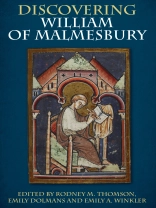A fresh look at William of Malmesbury which not only demonstrates his real greatness as a historian and his European vision, but also the breadth of his learning across a number of other disciplines.
In the past William of Malmesbury (1090-1143) has been seen as first and foremost a historian of England, and little else. This volume reveals not only William’s real greatness as a historian and his European vision, but also thebreadth and depth of his learning across a number of other fields. Areas that receive particular attention are William’s historical writings, his historical vision and interpretation of England’s past; William and kingship; William’s language; William’s medical knowledge; the influence of Bede and other ancient writers on William’s historiography; William and chronology; William, Anselm of Canterbury and reform of the English Church; William and the Latin Classics; William and the Jews; and William as hagiographer.
Overall, the volume offers a broad coverage of William’s learning, wide-ranging interests and significance as revealed in his writings.
Rodney M. Thomson is Emeritus Professor of Medieval History at the University of Tasmania; Emily Dolmans is a lecturer in English Literature at Jesus College and Oriel College, University of Oxford; Emily A. Winkler is the John Cowdrey Junior Research Fellow in Medieval History at St Edmund Hall, University of Oxford, and Departmental Lecturer in Medieval History.
Contributors: Anne E. Bailey, Emily Dolmans, Daniel Gerrard, John Gillingham, Kati Ihnat, Ryan Kemp, William Kynan-Wilson, Anne Lawrence-Mathers, Stanislav Mereminskiy, Samu Niskanen, Joanna Phillips, Alheydis Plassmann, Sigbjørn Sønnesyn, Rodney M. Thomson, Emily Joan Ward, Emily A. Winkler, Michael Winterbottom.
Tabela de Conteúdo
Discovering William of Malmesbury: The Man and his Works – Emily Dolmans and Emily A. Winkler
Gesta Pontificum Anglorum: History or Hagiography? – Anne E. Bailey
William of Malmesbury and Civic Virtue – Daniel Gerrard
The Ironies of History: William of Malmesbury’s Views of William II and Henry I – John B Gillingham
William of Malmesbury and the Jews – Kati Ihnat
Advising the King: Kingship, Bishops and Saints in the Works of William of Malmesbury – Ryan Kemp
Roman Identity in William of Malmesbury’s Historical Writings –
William of Malmesbury and the Chronological Controversy – Anne Lawrence-Mathers
William of Malmesbury and Durham: the Circulation of Historical Knowledge in Early Twelfth-Century England – Stanislav Mereminskiy
William of Malmesbury as Librarian: the Evidence of his Autographs – Samu Niskanen
William of Malmesbury: Medical Historian of the Crusades – Joanna Phillips
German Emperors as Exemplary Rulers in William of Malmesbury and Otto of Freising – Alheydis Plassmann
Lector amice, : Reading as Friendship in William of Malmesbury – Sigbjorn Olsen Sonnesyn
William of Malmesbury’s Historical Vision – R. M. Thomson
‘Uerax historicus Beda’: William of Malmesbury, Bede and
historia – Emily Ward
William of Malmesbury and the Britons – Emily A. Winkler
Words, Words, Words… – Michael Winterbottom
Epilogue: The Rediscovery of William of Malmesbury – R. M. Thomson
Sobre o autor
RODNEY M. THOMSON is Emeritus Professor of Medieval History at the University of Tasmania.












